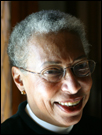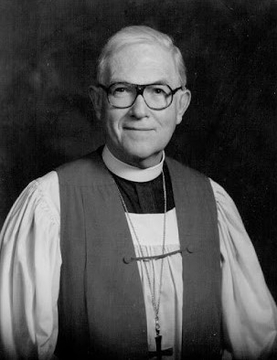Charles Ellsworth Bennison Jr. is an American bishop. He was the 15th bishop of the Episcopal Diocese of Pennsylvania.

Barbara Clementine Harris was an American bishop of the Episcopal Church in the United States. She was the first woman consecrated a bishop in the Anglican Communion. She was elected suffragan bishop of the Episcopal Diocese of Massachusetts, on September 24, 1988, and was consecrated on February 11, 1989. Eight thousand people attended the service, which was held at the Hynes Convention Center in Boston, Massachusetts. She served in the role of suffragan bishop for 13 years, retiring in 2003.

William White was the first and fourth Presiding Bishop of the Episcopal Church of the United States, the first bishop of the Diocese of Pennsylvania (1787–1836), and the second United States Senate Chaplain. He also served as the first and fourth President of the House of Deputies for the General Convention of the Episcopal Church.

The Episcopal Diocese of Pennsylvania is a diocese of the Episcopal Church of the United States, encompassing the counties of Philadelphia, Montgomery, Bucks, Chester, and Delaware in the state of Pennsylvania.
Alison Mary Cheek was an Australian-born American religious leader. She was one of the first women ordained in the Episcopal Church in the United States and the first woman to publicly celebrate the Eucharist in that denomination.
Henry Wise Hobson II, was the bishop for the Episcopal Diocese of Southern Ohio. When he was consecrated at the age of 38 in 1930, he was the youngest Episcopal bishop in the United States, and at his death, he was the oldest bishop in the Episcopal Church. He was also involved with the founding of Forward Movement Publications at the Episcopal Church.
Paul Washington was an Episcopal priest and community activist in Philadelphia.

The ordination of women in the Anglican Communion has been increasingly common in certain provinces since the 1970s. Several provinces, however, and certain dioceses within otherwise ordaining provinces, continue to ordain only men. Disputes over the ordination of women have contributed to the establishment and growth of progressive tendencies, such as the Anglican realignment and Continuing Anglican movements.

Walter Cameron Righter was a bishop in the Episcopal Church in the United States of America. He served the Diocese of Iowa from 1972 to 1988. He then served as assistant bishop for the Diocese of Newark from 1989 to 1991.

Bavi Edna "Nedi" Rivera is a bishop of the Episcopal Church who served as a suffragan bishop in the Diocese of Olympia and as the Seventh Bishop of the Diocese of Eastern Oregon. She was the first Hispanic woman elected to become a bishop in the Episcopal Church. Her late father, Victor Rivera, was also a bishop in the church.
Albert Arthur Chambers was the seventh bishop of the Episcopal Diocese of Springfield, serving from 1962 to 1972. He then retired in part because he opposed revising the Book of Common Prayer and ordaining women as priests, which would be expressly authorized by the General Convention in 1976.
The Philadelphia Eleven are eleven women who were the first women ordained as priests in the Episcopal Church on July 29, 1974, two years before General Convention affirmed and explicitly authorized the ordination of women to the priesthood.

Frank Whittington Creighton was an American Episcopal bishop.

Lyman Cunningham Ogilby was an Episcopal priest who became a missionary bishop in the Philippines, coadjutor bishop in the Episcopal Diocese of South Dakota and later the Episcopal Diocese of Pennsylvania, where he succeeded Bishop Robert L. DeWitt and became the 13th diocesan bishop until his retirement.
James Russell Moodey was bishop of the Episcopal Diocese of Ohio from 1983 to 1994.
William Hawley Clark was bishop of the Episcopal Diocese of Delaware, serving as diocesan from 1975 to 1985. He was elected January 24, 1975, consecrated on May 16, 1975, and installed on May 18, 1975. Clark retired on December 31, 1985.

Barry Robert Howe was bishop of the Episcopal Diocese of West Missouri, serving from 1999 to 2011.
Allen Lyman Bartlett Jr. is an Episcopal priest who became coadjutor bishop in the Episcopal Diocese of Pennsylvania, the fourth largest in the country. He succeeded Bishop Lyman Ogilby as the diocese's 14th bishop until his retirement. Since his retirement, he has assisted in his former diocese as well as other dioceses, including the Episcopal Diocese of Washington (2001-2004).
John Pares Craine was the eighth bishop of the Diocese of Indianapolis in The Episcopal Church, serving from 1959 until his death on Christmas Eve in 1977, shortly before his scheduled retirement. He supported the ordination of women.
Arthur E. Woolley was an Episcopal priest noted for urban activism, racially integrated parishes, and conservative declarations, especially against the ordination of women.









